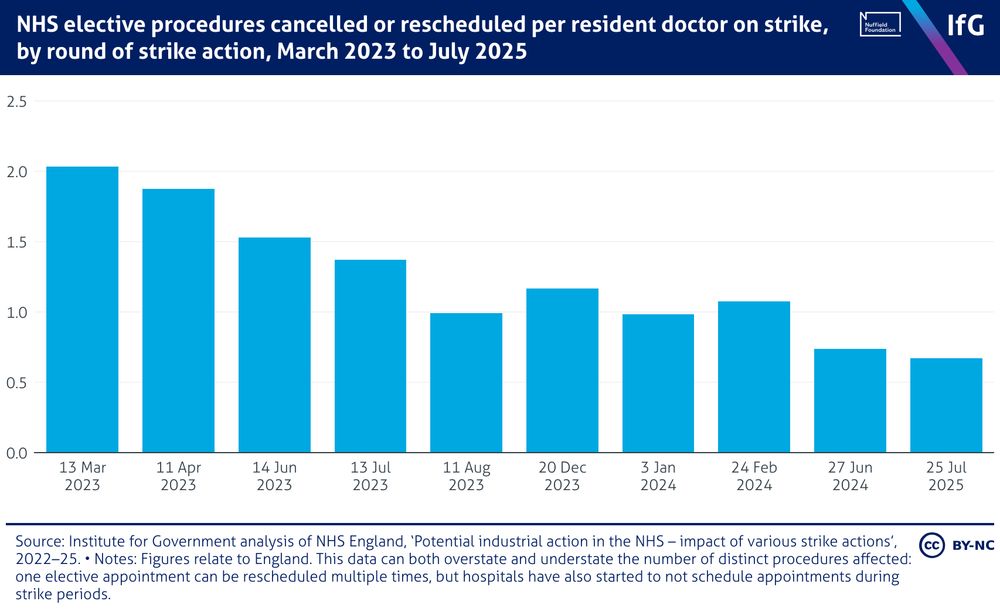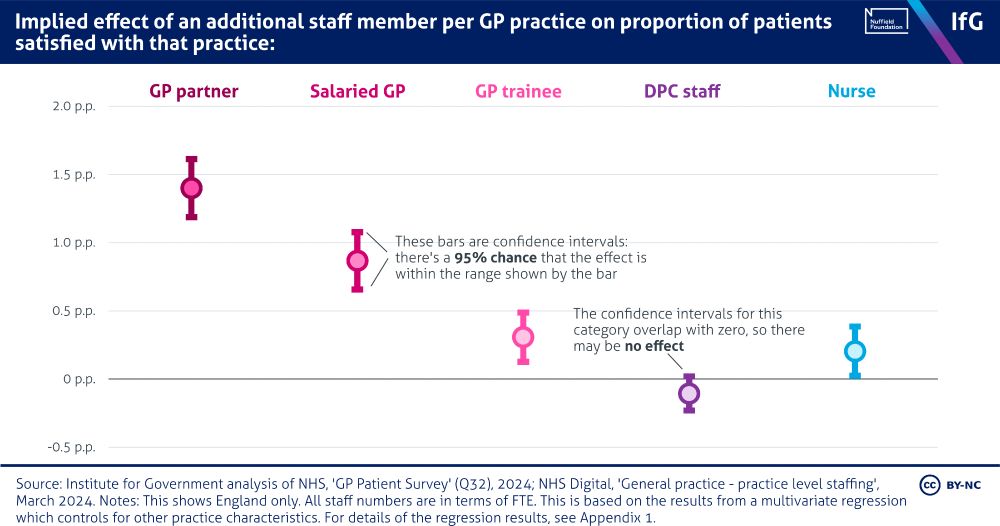
@InstituteforGov. Interested in the NHS, adult social care, and local government. All views my own. He/him
Govt is back to pencilling in undeliverable plans to hit its fiscal rules
After taking out likely funding for protected areas, other departments will have to absorb 3.3% annual real terms cuts. That includes prisons, courts, and local govt, among others

Govt is back to pencilling in undeliverable plans to hit its fiscal rules
After taking out likely funding for protected areas, other departments will have to absorb 3.3% annual real terms cuts. That includes prisons, courts, and local govt, among others
Each dot shows a trust's bed occupancy in a given month
What's notable is how little variation there is across the country and across time
Go into any hospital in any month and you will find almost every bed is occupied

Each dot shows a trust's bed occupancy in a given month
What's notable is how little variation there is across the country and across time
Go into any hospital in any month and you will find almost every bed is occupied
Best comparator I found was ONS data, but that's on a UK level and is based on self-reporting in the LFS whereas NHS data is from the admin system
Still, seems to be higher in the NHS than the economy

Best comparator I found was ONS data, but that's on a UK level and is based on self-reporting in the LFS whereas NHS data is from the admin system
Still, seems to be higher in the NHS than the economy
Absences for that reason have grown far faster than the combination of other reasons since 2016
Staff were absent for 1.4% of all working days for mental health reasons in YE May 2025

Absences for that reason have grown far faster than the combination of other reasons since 2016
Staff were absent for 1.4% of all working days for mental health reasons in YE May 2025
Most of it is nonsense though. A campaign of "pharmacy first, GP second, A&E last" will do nothing for A&E performance
Ditto cutting managers
And the independent sector is only good for some activity

Most of it is nonsense though. A campaign of "pharmacy first, GP second, A&E last" will do nothing for A&E performance
Ditto cutting managers
And the independent sector is only good for some activity
The top performing acute trust is Northumrbia, where elective performance is at almost 80%
But there are also acute trusts where less than 50% of people are treated within 18 weeks
I'll do a longer thread on elective performance later

The top performing acute trust is Northumrbia, where elective performance is at almost 80%
But there are also acute trusts where less than 50% of people are treated within 18 weeks
I'll do a longer thread on elective performance later
- 12+ hour A&E waits have not come down at all
- Ambulance response times remain higher than pre-pandemic levels
- Progress on long elective waits has stalled
Though govt might argue that none of these are its priority



- 12+ hour A&E waits have not come down at all
- Ambulance response times remain higher than pre-pandemic levels
- Progress on long elective waits has stalled
Though govt might argue that none of these are its priority
Waiting times in key areas have improved slightly since the election in elective care, diagnostics, cancer care, and 4-hour A&E waits
All positive, but from a really low base and still a long way from national targets

Waiting times in key areas have improved slightly since the election in elective care, diagnostics, cancer care, and 4-hour A&E waits
All positive, but from a really low base and still a long way from national targets
That's much higher than govt's goal of 4.1%. If NHS had achieved that in 2024/25, it would have meant 5.4 million more working days, equivalent to ~24k more FTE staff

That's much higher than govt's goal of 4.1%. If NHS had achieved that in 2024/25, it would have meant 5.4 million more working days, equivalent to ~24k more FTE staff
Though there's evidence that the impact is falling. When resident doctors first went on strike the NHS cancelled or rescheduled 2.0 elective appts per doctor. Now it's only 0.7


Though there's evidence that the impact is falling. When resident doctors first went on strike the NHS cancelled or rescheduled 2.0 elective appts per doctor. Now it's only 0.7
Very few trusts are below RCEM safe levels, and often they're small specialty trust

Very few trusts are below RCEM safe levels, and often they're small specialty trust
The maintenance backlog in hospitals is now larger than the entire DHSC capital budget (£16.3bn in 2025/26 prices vs £13.6bn)
That means leaks closing wards, diagnostic equipment breaking down, etc

The maintenance backlog in hospitals is now larger than the entire DHSC capital budget (£16.3bn in 2025/26 prices vs £13.6bn)
That means leaks closing wards, diagnostic equipment breaking down, etc
Very crude metric, but we can compare changes in activity to changes in staffing since 2019
In elective care, only 3/42 ICBs grew elective activity grew faster than staff
Diagnostics fairs better (15/42 ICBs)


Very crude metric, but we can compare changes in activity to changes in staffing since 2019
In elective care, only 3/42 ICBs grew elective activity grew faster than staff
Diagnostics fairs better (15/42 ICBs)
Latest ONS data is only to the end of 2022/23, but more up to date reports from NHSE and ONS seem to indicate that the upward trend has continued
If so, it will mean that planned spending on NHS goes further than currently

Latest ONS data is only to the end of 2022/23, but more up to date reports from NHSE and ONS seem to indicate that the upward trend has continued
If so, it will mean that planned spending on NHS goes further than currently
- Hiring has slowed. There has been no growth in non-clinical staff working in hospitals since 2023
- Joiner rates are tumbling across staff groups
- Nursing vacancy rates are at historic lows, due to trusts slowing hiring



- Hiring has slowed. There has been no growth in non-clinical staff working in hospitals since 2023
- Joiner rates are tumbling across staff groups
- Nursing vacancy rates are at historic lows, due to trusts slowing hiring
And 2025/26 is looking even worse, with 32 out of 42 ICBs forecasting a defict

And 2025/26 is looking even worse, with 32 out of 42 ICBs forecasting a defict
Hospital finances struggled in the late 2010s, with acute trusts running deficits in every year between 2015/16 and 2019/20. It was only Covid funding which returned trusts to surplus
But deficits in acute trusts returned in 2022/23 and 2023/24

Hospital finances struggled in the late 2010s, with acute trusts running deficits in every year between 2015/16 and 2019/20. It was only Covid funding which returned trusts to surplus
But deficits in acute trusts returned in 2022/23 and 2023/24
Under current plans, spending will grow by roughly similar amounts under this govt (2.7% per year)
That's below historic average (3.9% 1950/51 to 2009/10) and well below New Labour (5.9%)

Under current plans, spending will grow by roughly similar amounts under this govt (2.7% per year)
That's below historic average (3.9% 1950/51 to 2009/10) and well below New Labour (5.9%)
Our view is that govt has made limited progress on most services
The exceptions are children's social care, where reforms look really positive
And adult social care, where govt has likely harmed the sector

Our view is that govt has made limited progress on most services
The exceptions are children's social care, where reforms look really positive
And adult social care, where govt has likely harmed the sector
I couldn't agree more with this section: the NHS and govt is hoping that shiny tech improvements will solve everything, while ignoring the fundamentals
committees.parliament.uk/publications...

I couldn't agree more with this section: the NHS and govt is hoping that shiny tech improvements will solve everything, while ignoring the fundamentals
committees.parliament.uk/publications...
It claims we "ignore" their £1.1bn of investment in general practice...accept we don't. There's a whole section that says exactly that
Our report is on our website, it'd be great if DHSC read it
www.instituteforgovernment.org.uk/publication/...


It claims we "ignore" their £1.1bn of investment in general practice...accept we don't. There's a whole section that says exactly that
Our report is on our website, it'd be great if DHSC read it
www.instituteforgovernment.org.uk/publication/...
That is a terrible way to make a decision which will define the govt's health policy for this parliament

That is a terrible way to make a decision which will define the govt's health policy for this parliament
That would require improvements in general practice, ASC, public health, and wider determinants of health i.e. it'd actively support the community and prevention shifts

That would require improvements in general practice, ASC, public health, and wider determinants of health i.e. it'd actively support the community and prevention shifts
But nothing concrete. And even if there were, it is hard to replace partners' discretionary effort or the improved satisfaction patients have in practices with more partners

But nothing concrete. And even if there were, it is hard to replace partners' discretionary effort or the improved satisfaction patients have in practices with more partners
So it's good that there are many more salaried GPs. But that's happening while the partnership model crumbles: GP partners continue to leave the service, with no sign of change

So it's good that there are many more salaried GPs. But that's happening while the partnership model crumbles: GP partners continue to leave the service, with no sign of change

